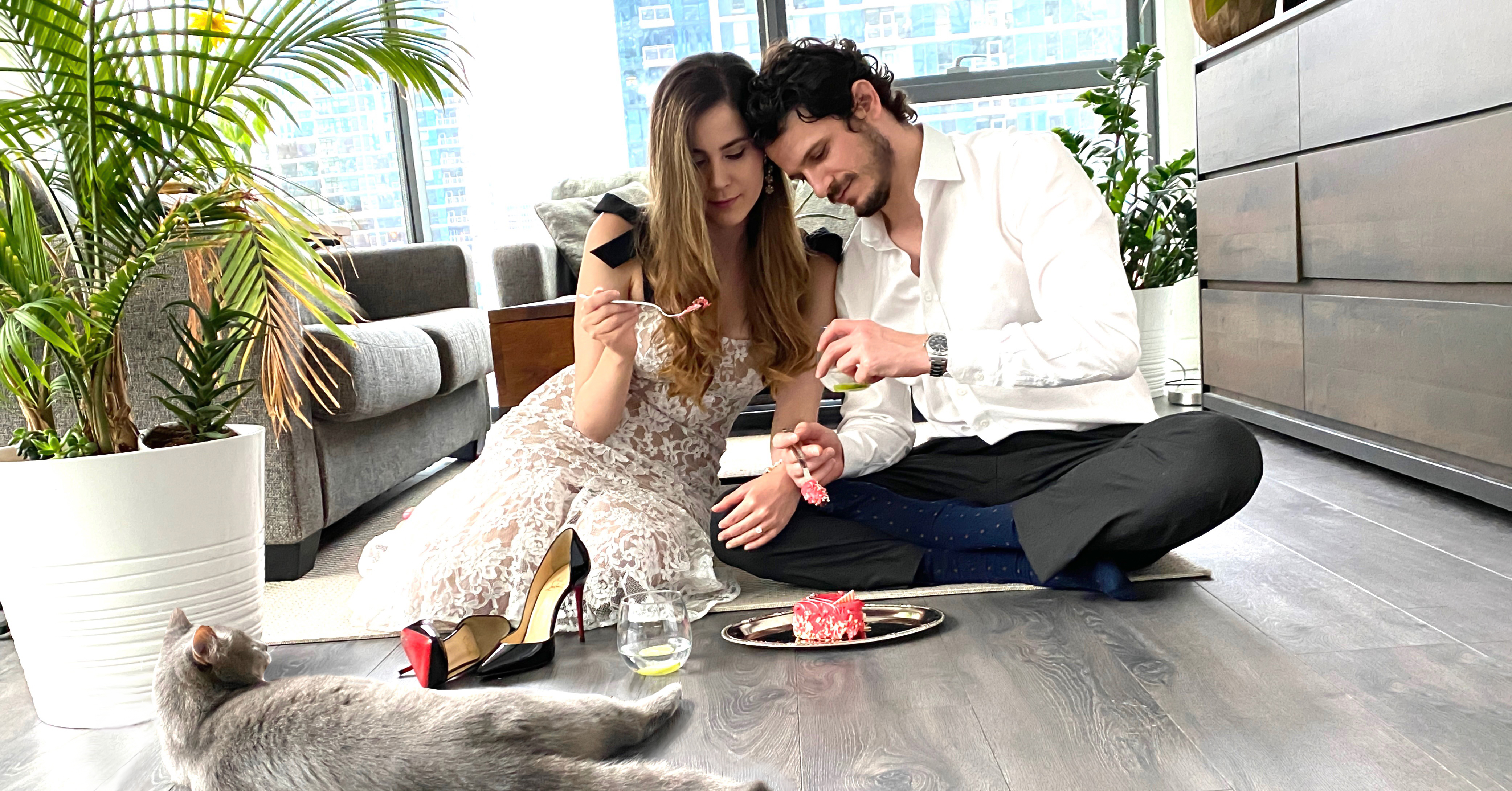Stories Help Us Survive—and Thrive
Even during “normal” times, telling stories yields positive side effects, including a chance to change our relationship with time and rediscover the relationships and mundane miracles we once took for granted. Though it has caused untold suffering, the pandemic has also created space and time for reflection: going through family photos, reconnecting with old friends, or eating wedding cake on the floor with your fiancé when shelter-in-place orders have put your wedding vows on hold.
Moments before midnight on December 31, 2018, I took a deep breath, cleared my throat, and dropped to one knee to propose. Popping the question is always a leap of faith: life is full of uncertainty, unexpected twists and turns, that derail the best intentions. But when I asked—and she said “yes”—we couldn’t foresee how intimately that uncertainty would touch us. We planned the wedding for March 21, 2020; we tested cake samples; gave down payments to the venue and vendors; our guests booked flights and hotel rooms. The happy, stressful buzz of wedding planning enveloped us. Then, the night before our wedding, officials banned all gatherings of more than ten people and ordered us to shelter in place. The order came into effect in Chicago at 5pm on the very day, at precisely the moment, we were to be walking down the aisle.
“At least it’ll make a great story for our book,” we consoled ourselves, referring to a memoir we’re co-authoring. After taking a moment to grieve, eating the wedding cake together in our apartment, we regained perspective. Despite the chaos around us, the important things remained intact and untouchable: our intentions, our love, and, most importantly, our story. Storytelling is a human instinct, vital to life. It is necessary to survive uncertainty and thrive through disruption. By reframing our postponed wedding as a “story for our book,” we weren’t just coping. We were also taking control of what was within our power to change.
Stories Are Vital to Life
Because narrative drives human life—defining our relationships, goals, projects, and characters—the pandemic has challenged our understanding of who we are. We risk losing our sense of forward progress toward the next chapter. We cultivate resilience by recognizing that our stories can and should be diverse. Not all narratives are linear: unforeseen obstacles and plot twists make better stories.
The pandemic has forced us to admit our own fragility, so much so that business is booming for estate attorneys. We should preserve our stories no less diligently than we record our last will and testament or advance medical directives. Without life insurance or an updated will, we would feel delinquent in our obligation to our families and descendants. But we are equally responsible for preserving our stories, which convey values that give meaning to our legacy and our children’s inheritance. We wouldn’t die intestate, nor should we be caught dead without a story.
Our humanity depends on telling and preserving stories; without which, life slips away—we become isolated, tiny blips of light in the vast darkness of history. It’s hard to preserve memories before they fade. Grandma’s story often goes through one ear and out the other: we act as if she’ll always be there to tell it. We assume that our own memories will always be vivid and easy to access. But life moves fast and it’s hard to process. Telling your story helps make sense from the otherwise overwhelming speed and density of life.
Although there’s so much data about us available—from social media to ancestry and genealogy– the vast sea of Instagram and Facebook posts lack the richness and depth that our stories, our lives, deserve. This is why my brother and I built a business to empower people to tell their own stories—from the heroism and trauma of world events to the mundane miracles of daily life. We see every day how preserving stories pre-serves the future: storytelling is a proactive form of service for oneself, one’s communities, and future generations.
From refugees and underserved students to isolated seniors and Holocaust survivors, humans need to connect through stories as much as we need food and medicine. By telling our story and listening to the stories of others, we can be better friends, caregivers, colleagues, parents, children, neighbors, and allies. Telling your story is not a selfish act but an affirmation of shared humanity.
Everyone Has a Story
Everyone has a story, but telling it can feel daunting. Fortunately, we’re already telling our stories every day, through internal monologues and informal conversations with strangers and loved ones. Rather than feel pressured to write the next bestseller, you can narrate your life in micro-steps: for example, by recording brief voice memos and interviewing others when the time feels right. With this proactive foundation, your story will practically write itself.
When we’re separated from loved ones, when milestones and celebrations are postponed, telling stories restores meaning to our lives. Now is always the time to speak up for ourselves and others. Whatever story you have to tell, now is the time to tell it. This will not only help you connect with the people you care about. It will also help tighten the frayed cords of connection that bind together our families, our communities, and our world.
Future generations will gape with wonder when they learn of our historic, collective experience. They will turn to the stories we tell now for guidance and inspiration in their own time. But now, we must each tell our own story—not just for posterity, but to understand ourselves and shape our own lives.


